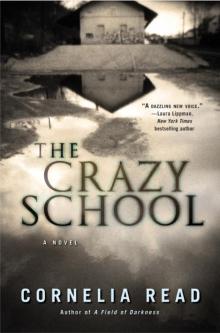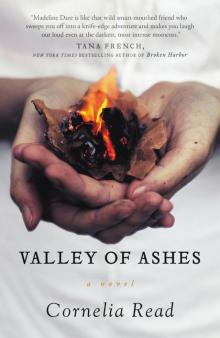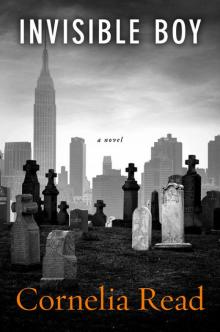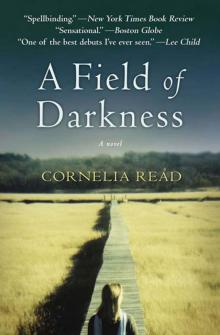- Home
- Cornelia Read
The Crazy School Page 6
The Crazy School Read online
Page 6
Tim smiled. I wondered whether the female students rated a mention.
“Works like a charm,” said Santangelo. “Half the time these days, they don’t even make it to the Mass Pike. We’ll get a call from the night cashier at some gas station mini-mart. Kid will still be standing outside when the school van pulls up—big Styrofoam cup of bad joe in one hand, Marlboro in the other.”
Tim waved his hand again. “So you ask us to give up coffee and everything for, like, solidarity?”
Santangelo nodded. “You have to be doing the same kind of work on yourself as the kids are. If you don’t have as much at stake as they do, you can’t ask for their respect, and we can’t help them.”
Tim beamed in response to that. “That’s so true, Dr. Santangelo.”
Santangelo beamed right back.
Even then, captivated as I was by the man’s charisma, I figured there was more to it.
For one thing, I’d caught a back-window glimpse of the honking big brass-and-copper espresso machine that glittered at the center of the man’s kitchen counter.
And as the semester progressed, I began to suspect that the thousands of petty rules he expected his employees to comply with—not to mention the fear and exhaustion that doing so engendered—were designed to keep us off balance, to break us down. Like, say, boot camp in the Marine Corps, or not being allowed to go to the bathroom during EST seminars back in the day.
He wanted us on edge. Vulnerable. Hankering for a cool chalice sip of Flavor Aid after he’d run us ragged on the Long March.
Good for the program.
Good for the disease.
Good, most of all, for Santangelo.
Lulu barged into my musings. “Want a refill?”
“Bet your sweet ass,” I said, lighting myself another Camel before I tossed her the pack.
If nothing else, this place had gotten me well in touch with my inner sixteen-year-old boy.
He was pissed.
9
By the time lunch rolled around, I was actually hungry. I loaded my plate with salad and a hunk of lasagna, joining the other teachers at a corner table.
Lulu patted the empty chair next to her, then resumed her conversation with Pete.
I’d barely peeled off the top layer of dessicated pasta when Santangelo rose from his seat across the room.
The sight of him extinguished conversation table by table. He cleared his throat, and the last voice winked out midsentence.
“Today,” he said, “I want to discuss something of vital importance to all of us as a community. Something that should stand as an emblem of our concern for one another—our mutual respect, our common courtesy.”
His gaze roved across the room, pausing to narrow in on random offenders. “We all—every one of us—need to become more aware of the salad bar.”
He rocked back on his heels, looking up as though petitioning the heavens for the strength to continue. “The level of disrespect . . . croutons in the Thousand Island . . . carrot shreds mixed with the chickpeas and the olives . . .”
Below the table, Lulu began to saw the blade of a butter knife slowly back and forth across her wrist.
“We cannot continue to operate in this state of confusion,” Santangelo declaimed, shaking an indignant finger, “this passive-aggressive inattention to our surroundings.”
“He is so right,” said Mindy.
She maneuvered a wedge of fish stick into her prim mouth, then chewed while nodding and blinking in reverence.
“If we are to survive as a community,” said Santangelo, “we cannot continue to indulge ourselves in such appalling displays of arrogance.”
He looked around the room again. “I’d like you all to join me in a moment of reflection.”
He walked over to the source of his consternation and laid a loving hand on the hazed Plexiglas of its sneeze guard, then bowed his head. So did the band of administrators and staff at his table.
Mindy closed her eyes and followed suit, still chewing.
Lulu made a sly choking noise. I leaned my shoulder against hers. If we laughed, we were dead meat. She pressed the knife’s blunt tip into her thigh. I bit the inside of my cheek.
New Guy Pete looked over at me and raised an eyebrow. I wasn’t sure if that was intended to convey commiseration or judgment.
Santangelo raised his head. “Thank you,” he said. “I know you’ll all take this conversation to heart, because each of you values the integrity of our community as deeply as I do.”
The room stayed quiet while he walked back to his seat, then everyone slowly resumed the business of eating lunch.
Tim asked Pete if he could please pass the salt. Mindy turned to Gerald and picked up where she’d left off about lesson plans.
Lulu and I exhaled.
The lasagna sucked, but I wasn’t about to go get more salad.
I sank into the middle of Sookie’s love seat two minutes early, relishing my rare sole possession of the thing.
“Hi,” I said. “How’s your day going?”
It had gone gloomy outside, afternoon sky piled thick with gray-blue Brillo clouds.
Sookie turned on her desk lamp, then pulled up a chair within hand-holding distance. “Have you given more thought to what we discussed in our last session?”
“Things have been frenetic,” I said. “You heard about Mooney punching out the window?”
She gave me a disappointed smile. “And you didn’t feel your own issues merited consideration?”
“No offense, Sookie,” I said, “but having failed to recognize the slightest connection between myself and the issues you ascribed to me, I didn’t feel they had merit to consider.”
“Then why are you here?”
“I wasn’t aware I had any choice.”
The radiator clanked on, sending up a yeasty and slightly burnt perfume, like cafeteria toast.
“Look,” I said, “I have no idea what this is supposed to accomplish.”
“This session?”
“This session. Therapy in general. I mean, do you really expect me to have some big epiphany about repressed memories of sexual abuse in the next hour?”
“I think it’s worth pursuing,” she said.
“Why, exactly?”
“Your resistance,” she said.
“See, here’s what I don’t get about this whole process—how does my saying your hypothesis is bullshit deepen your conviction that it’s valid?”
“That hostility tells me this idea resonates with you in a profound way. We resist what we can’t face.”
“So the only way you’d believe I wasn’t molested is if I agreed that I had been?”
She cleared her throat and started fussing with her skirt, smoothing it out over her crossed knees.
“I mean, Sookie,” I said, “why not throw me in a pond to see if I float like a witch?”
“If you’re embarrassed to discuss your sexuality—”
“God, no,” I said. “I’d be happy to regale you with anecdotes about my misspent youth. That might actually be interesting.”
“So you were promiscuous?” She perked right up. “Another classic hallmark of childhood molestation.”
“Sookie, give this shit a rest, okay?”
“I don’t bring it up lightly.”
“You brought it up because of my posture, for chrissake,” I said. “What next, you’ll analyze the color of my aura?”
“You meet all the criteria,” she said. “Discomfort with intimacy, aversion to physical contact—”
“Wait, I’m promiscuous and I can’t stand physical contact?”
Sookie glared. “You dislike being touched whenever someone offers you a gesture of comfort during our sessions.”
“Want me to sit in Mindy’s lap and lick her forehead?”
She ignored that. “Then there’s your insomnia, the perfectionism, the distrust of authority figures—”
“Figures such as yourself?”
“Not limited
to me,” she said. “Your attitude hasn’t gone unnoticed by the administration.”
“So the hallmark of an unmolested childhood is blind faith in authority? I hate to break it to you, Sookie, but that’s not mental health, that’s Stalinism.”
“Once again, I see I’ve struck a nerve.”
“Struck a nerve? You’re trying to convince me I’m non compos mentis because I have the gall to insist that my life experience differs from your cheesy movie-of-the-week presumptions about it.”
“You’d characterize childhood sexual abuse as cheesy?”
“Don’t be an idiot.”
“So now I’m Stalin and an idiot.” The woman was actually pouting.
“Oh, for God’s sake,” I said.
She was plucking at her skirt again, avoiding my eyes.
“I don’t deny having major gnarly fissures in my psyche, okay?” I said. “But you’re trying to shoehorn me into some completely bogus DSM-III template, here.”
She sniffled, and I wondered if I’d have to do a turn-in for making my therapist cry.
“Sookie?” I put my hand on her knee. “I’m sure you mean really well with all of this, and if it were true, you’d be doing a bang-up job and everything, you know? It’s just that Lolita has left the building.”
She stared into her lap, eyes all glittery with gathering moisture.
“Look,” I said, trying to coax a smile out of her, “would it cheer you up if I swam out to the middle of a pond and sank, as proof of my good intentions?”
Her head snapped up. “Why are you so hostile, Madeline? What’s behind your pathological need to belittle everyone you come in contact with?”
I yanked my hand back.
“This is a healing, supportive community,” she went on, “and all you can do is snipe at us. Maybe I’m off base, concluding you were molested, but I just want to figure out what kind of trauma could have produced someone so hell-bent on slapping away the hand of anyone offering the slightest kindness.”
I crossed my arms. “This is kindness?”
She nodded. “Absolutely.”
“And you’ve never questioned anything done here in the name of therapy?”
She flinched away from me, dropping her eyes again.
I leaned toward her. “Explain how dorm parents making a kid kneel on a stone floor until three a.m. is kindness, Sookie.”
“I’m sure Dr. Santangelo would never countenance such a—”
“Dr. Santangelo spent half this morning’s faculty meeting screaming at Tim because Tim had objected to it. The man was spewing all this corrosive shit about how the kids should shove poor Tim’s head through a blackboard because he’d had the gall to speak up.”
“That’s not—”
“Not what, Sookie?” I asked. “Not ‘healing and supportive’?”
She blanched.
“You’re forgetting what I tried to discuss yesterday,” I said. “How I’m terrified that I’m not doing my best to help these kids. That wasn’t worthy of your consideration, was it?”
“Madeline, you have to know that I’d never—”
“I watched a kid practically bleed to death when he punched his hand through a window yesterday. I watched his girlfriend eat a hunk of his flesh off the glass after they took him away in the ambulance.”
Sookie winced.
“And all Santangelo can do is scream at a concerned teacher when some other boy gets tormented until dawn by his dorm parents?”
She didn’t answer.
“You wonder why I’m hostile?” I said. “Get a kumba-fucking-ya clue, lady.”
I stood up and walked over to the window.
“Goddamn joke to call this place a ‘healing community,’” I said, taking in the sorry-ass view of campus. “Kids would stand a better chance if you guys broke out some leeches and gave them all a good bleeding.”
Okay, so now she was crying.
I sighed and turned around.
Sookie tried to choke back a sob.
“Have some Kleenex,” I said, grabbing a box off her desk and putting it in her lap.
She yanked out a half dozen sheets and blew her nose, then balled them up and made a wussy pitch at the wastepaper basket. It landed two feet short.
I leaned down to pick the wad off the carpet and tossed it home.
“I’m sorry,” she said.
“So you throw like a girl.” I shrugged. “There are worse things.”
“No,” she said, “I mean—”
Her hands fluttered, and she got all choked up again.
“I went back to school for this,” she said. “I worked my ass off to get a degree because I want to help people . . . the kids . . .”
“What’d you do before?”
“Wall Street.”
Perfect, my very own shrink-broker.
All the same, I felt shitty for making her cry.
“Look,” I said, “you want to do therapy, let’s do some goddamn real therapy.”
She nodded, taking a shaky breath.
I sat on the love seat and took a shaky breath of my own.
“Last year,” I said, “someone I cared about a great deal tried to kill me.”
“My God, Madeline! How did you cope with that?”
“I shot him.”
She reached for my hand. I let her take it.
“Are you worried he’ll come after you again?” she asked.
“No,” I said.
“You’re sure?” she asked. “Depending on his pattern of behavior—”
“I emptied both barrels of a shotgun into the man’s neck from so close it practically took his head off.”
She didn’t say a word in response to that, just held my gaze and reached for my other hand. The two of us were so quiet I could hear the rumble of a man’s voice from behind some closed door down the hall, then the hesitant clatter of a hunt-and-peck typist.
“Someone you cared about,” she said at last.
I closed my eyes.
“A great deal,” she said.
“Yeah.” Such a tiny word, with so very much freight behind it.
I pulled both hands free of hers. Covered my face.
“Madeline, I have no doubt you did the only thing you could have in that devastating situation.”
I opened my eyes. Drew my knees up to my chest and wrapped my arms around them.
Sookie was tearing up again. “I’m proud of you. You chose to survive.”
“The hard part,” I said, “is learning to live with that decision.”
“You’ve taken the first step, telling me about it.”
Not first step. More like last resort.
The warning bell rang for the day’s final class. I stood up.
“Will you come back to see me on Monday?” she asked. “I’d like to hear more.”
“Glutton for punishment,” I said. “Same bat time?”
“Same bat channel.”
10
The Brillo sky was spitting down cold rain, so I sprinted out of the Mansion with my jacket pulled over my head.
Sitzman and Wiesner were already in the classroom by the time I skidded down the hallway. It was just the three of us for the day, what with Mooney and Forchetti being down on the Farm.
We got through a good bit of the late forties and early fifties, polished off the Korean War (with a fast-forward to Eisenhower’s Military-Industrial Complex speech in ’61), even worked in a bit of McCarthy intro before the bell rang.
I was expecting the pair of them to bolt on the dot of three o’clock, but they didn’t budge. Maybe it was the rain.
“Are you going to make us talk more about this Red Scare shit on Monday?” asked Wiesner.
I tilted my chair back. “What kind of shit would you prefer?”
“I don’t know,” he said. “Something that doesn’t revolve around, like, totally boring dead guys.”
“It’s a history class, Wiesner,” I said. “History tends to revolve around totally
boring dead guys.”
“Maybe you could skip the boring part just for a day? There must be a couple of interesting dead guys.”
“Pick one,” I said. “Doesn’t have to be a guy.”
“Oh yeah, like dead chicks are interesting,” said Wiesner. “Betsy goddamn Ross. Give me a break.”
“Amelia Earhart,” said Sitzman. “She was cool.”
“Bitch might still be alive if she wasn’t such a sucky pilot,” said Wiesner.
Sitzman laughed. “She was not sucky, Wiesner—she had a drunk navigator.”
“Yeah, and?” Wiesner threw up his hands. “You want to impress me, Sitzman, try landing your plane someplace that’s not the middle of the Pacific Ocean. I mean, Amelia couldn’t have just said, ‘Yo, navigation dude, I know you’re all drunk and shit, but that’s totally water down there . . . drop the tequila and find us a damn island already’?”
“She still kicks major Betsy Ross ass,” said Sitzman.
“Oh, like I actually picked Betsy Ross.”
“So pick someone else already, Wiesner,” I said.
Wiesner looked down at his desk. “Judy Garland.”
“What’re you, gay?” asked Sitzman.
“Suck my dick,” said Wiesner. “She was really good in The Wizard of Oz. Especially if you do bong hits and watch it with Pink Floyd going.”
Sitzman wasn’t buying it. “What, like, ‘Another Yellow Brick Road in the Wall’?”
“ Dark Side of the Moon,” said Wiesner. “You start the CD right when the MGM lion roars the second time. Then all this stuff happens that matches the lyrics . . . like it goes to color at exactly the start of ‘Money,’ and then Glinda the Good Witch floats up in her bubble right when they say, ‘Don’t give me that do-goody-good bullshit.’”
“You have to start it at the end of the third roar, Wiesner,” I said.
They turned to stare at me, slack-jawed.
“Oh, please,” I said. “My parents did more bong hits than you guys.”
“Huh,” said Wiesner, “no wonder you’ve got such a shaky sense of boundaries.”
“Make up your mind,” I said. “Yesterday you told me I had issues around authority.”

 The Crazy School
The Crazy School Valley of Ashes
Valley of Ashes Invisible Boy
Invisible Boy A Field of Darkness
A Field of Darkness